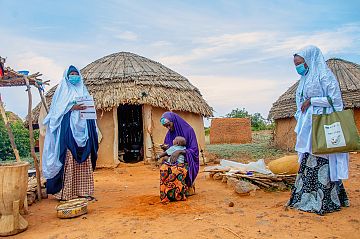Exciting potential for increased protection against malaria for young children in combining malaria vaccine with seasonal malaria chemoprevention
27 August 2021 Community distributors directly observe a caregiver administering SPAQ to her child during the 2020 SMC campaign, Nigeria
Community distributors directly observe a caregiver administering SPAQ to her child during the 2020 SMC campaign, NigeriaA seminal paper, published on 25 August in the New England Journal of Medicine, details results from a three-year trial to test the efficacy of the RTS,S/AS01 E malaria vaccine in combination with the established distribution of antimalarial drugs to children under five during the rainy season in the Sahel region of Africa, known as seasonal malaria chemoprevention (SMC).
The double-blind, randomised, controlled trial, led by the London School of Hygiene & Tropical Medicine (LSHTM), followed nearly 6,000 children aged 5-17 months in Houndé, Burkina Faso and Bougouni, Mali over a period of three years. Seasonal vaccination with RTS,S/AS01 E was found to provide similar protective efficacy when compared with 4 monthly cycles of SMC per year, which adds to the evidence on the critical contribution that SMC, a highly cost-effective intervention, makes to the reduction in the malaria disease burden in eligible areas such as the Sahel region. Interestingly, a novel approach that uses the combination of SMC and seasonal vaccination lowered numbers of clinical episodes of malaria, hospital admissions with World Health Organization (WHO)-defined severe malaria and deaths from malaria by 62.8%, 70.5% and 72.9% respectively compared to SMC alone.
“This is really exciting research – it is very encouraging to see results of this nature in research around the control of malaria and it is certainly cause for celebration” said Dr James Tibenderana, Malaria Consortium Technical Director. Global gains in combatting malaria have levelled off in recent years and many high burden countries have been losing ground. Achieving maximum and sustained impact with the limited funding available is essential. Drawing on all of the established tools in our malaria toolbox to apply interventions, like SMC, alongside other existing and emerging proven interventions will be key to achieving this. As demonstrated by the trial, there is the potential for more public health impact to be gained by tailoring, targeting and adapting combinations to maintain progress along the continuum to malaria elimination.
“We should also be mindful that whilst promising, the results of this study should be rapidly translated into the real world setting if WHO recommends RTS,S for adoption and scale up following the pilot implementation multi-country study in Ghana, Kenya and Malawi. While the results demonstrate success at the efficacy level, under ideal and controlled circumstances, more work will be needed to develop institutionally operational and scalable delivery models in national health systems and to understand the effectiveness and cost of combining a seasonal vaccination with SMC” said Dr Jane Achan, Senior Research Adviser, Malaria Consortium.
“Closing the efficacy-effectiveness gap (EEG) will be quite complex and we hope to be able to contribute to this work in the near future. Malaria Consortium has been a leading implementer of SMC since WHO’s recommendation in 2012 and will reach 20 million children across six countries through its SMC programme this year. This provides a unique opportunity for implementation-effectiveness research on this novel approach” said Christian Rassi, Malaria Consortium’s SMC Programme Director.
Latest news
- International summit calls for AMR accountability in public health interventions21st March 2024
- Global SMC community celebrates new milestone at SMC Alliance Annual Meeting in Nigeria6th March 2024
- Scaling up key interventions could halve pneumonia-related childhood mortality13th February 2024
- Malaria Consortium and eGov Foundation join Mozambique’s national malaria programme to digitalise seasonal malaria chemoprevention campaigns8th February 2024
- World’s first malaria vaccine rollout launched in Cameroon22nd January 2024
- Digital solutions driving equitable access to health6th December 2023